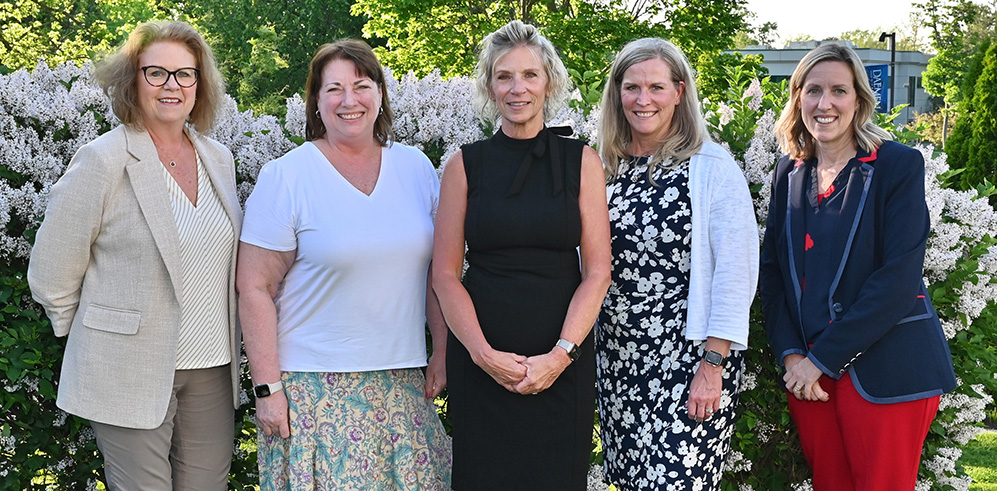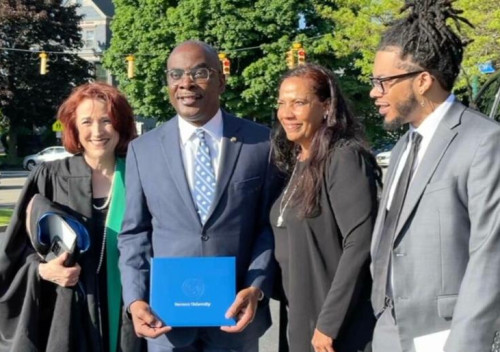Leadership & Innovation Virtual Info Sessions
Are you interested in advancing your career and making lasting change?
RSVP TodayEmployers and teams are focusing more than ever on creating healthy, communicative, fulfilling, and innovative work environments with strong leaders in every part of the team. Learn key skills to become a critical thinker, solve problems in new ways, and become an integral member of your team.

Jeanette Hughes, Heather Telford '09, Diane Lobdell '03 '14 2024 Alumna of Distinction Award Recipient, Michele Hubert-Ficus '20 and Cheryl Madge '19 at the 2024 Graduation Celebration
The leadership program is 36 credit hours that can be completed in 24 months. Classes meet once weekly, in the evenings, to accommodate working students' schedules.
- Winter/January start - Tuesday evening format that meets once a week
- Summer/May start - Tuesday evening format that meets once a week
- Fall/September start - Wednesday evening format that meets once a week
Why Leadership
Leadership and Innovation are skills every individual needs, regardless of their stage in life, career, or position. The skills learned in the program translate to every facet of life, and can truly create tangible change.
- The coursework focuses on developing your personal leadership skills, allowing students to immediately begin creating change in their personal and professional lives.
- Leadership is important, regardless of your role. You do not need to be in management to lead. Leadership skills are crucial to all members of a team.
- Weekly class meetings create a manageable workload, with evening classes accommodating a full-time work schedule.
- Innovation is a necessary skill in a consistently evolving world. Courses focus on creative problem solving, and students will gain useful skills to translate creativity into innovation.
- Students learn to implement change and how to navigate conflict within their organizations.
- Discussion and collaboratively based courses encourage students to explore their own leadership philosophies and create solutions to everyday challenges in their environments.
Career Outlook
Our graduates range in industry and position. We most often see our graduates rise through the ranks of their organization while taking on new and challenging roles.
Some of these roles have included:
- Executive Director
- President or Vice President
- Chief Operations Officer
- Educational Administrator
- General Manager
- Corporate Director
- Senior Quality Analyst
- Graduate Education Coordinator
Program Specifics
Specialty Tracks
Specializations allow students to meet their personal and career learning objectives. Leadership and Innovation students customize their research project/thesis and complete the specialization leadership course in one of four specialty tracks:
- Business
- Health Professions
- Higher Education
- Social Impact Organizations
Scholarships may not be combined; students may only receive one scholarship.
Graduate Merit Scholarship
30% off the graduate per credit hour tuition rate will be awarded to students upon acceptance. No application or additional information is required to receive this scholarship. For more information about the current per credit hour graduate tuition go to our Tuition and Fees page.
Graduate Alumni Scholarship
Additional scholarships may be available for alumni, please contact your admissions counselor for more information.
Americorps Matching Scholarship
Awarded to accepted Leadership and Innovation students who have completed an Americorps service commitment. Daemen University will match the 100 percent of the Segal Americorps Education Award OR provide a 30 percent tuition scholarship discount for Americorps alumni enrolling in our program.
Admission Requirements
- Complete the online application.
- A written statement from the applicant which describes the applicant's interest in the Leadership and Innovation degree and assesses the applicant's strengths as a leader and describes what the applicant hopes to gain from a graduate degree.
- Provide a resume of professional experience.
- Two letters of recommendation from an employer, professional colleague, or major professor which evaluate the applicant's leadership potential and capacity to complete a graduate degree.
- Official transcript(s) from all accredited colleges or universities attended indicating the award of an undergraduate degree.
- Personal interview with program director.
Graduation Requirements
A minimum cumulative grade point average (GPA) of 3.00 must be maintained to remain in good standing. A failed course must be repeated. It may also be necessary to repeat coursework in which a grade below B (3.0) has been earned in order to maintain the 3.0 overall GPA. A student is allowed a maximum of two repeats before being dismissed from the Executive Leadership and Change program.
Application for Degree: All graduate students are required to file an Application for Degree (PDF) form with the Registrar's Office at the onset of the final term of study. The application form is accessible on the Registrar's web page.

